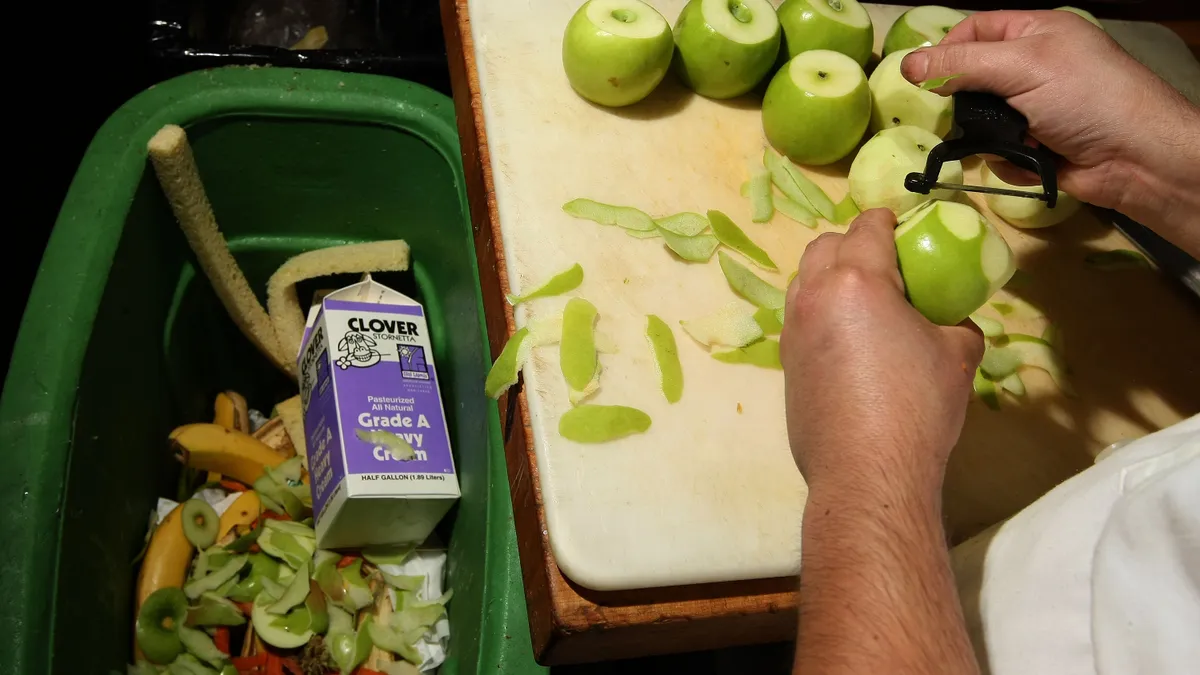Editor’s Note: Waste and recycling are inherently local issues in the United States, and we’re looking for new ways to highlight how these stories fit into broader trends. Send us your tips or feedback at waste.dive.editors@industrydive.com.
Stop Food Waste Day 2021
Wednesday marked the annual Stop Food Waste Day, as public- and private-sector partners turned attention to the 30% to 40% of U.S. food supply that goes to waste, per U.S. Department of Agriculture figures. That loss sets the nation back on goals to reduce hunger and food insecurity and often sends food to degrade in landfills, where it releases greenhouse gas emissions and contributes to global warming.
At a virtual event led by the nonprofit Food Tank, Sen. Richard Blumenthal, D-Conn., described food waste as “preventable,” “senseless” and “painful.” He and Rep. Chellie Pingree, D-Maine, highlighted legislation they’ve previously introduced to standardize food date labels across the U.S. and engage schools more in food recovery.
Rep. Dan Newhouse, R-Wash., also touted the Congressional Food Recovery Caucus’ advancement of that category of legislation. And Sen. Debbie Stabenow, D-Mich., spotlighted her efforts to write provisions for the American Rescue Plan “that fund the purchases of more food directly from farmers to feed hungry families” as well as “investments to help food companies retool processing lines, reducing food waste both on the farm and at the food processing facilities.”
Representing the local level, Denver Mayor Michael Hancock detailed efforts the city is making with residents and city employees alike to reduce food waste in their own kitchens, emphasizing how saving food can also save water, energy and labor. Hancock also highlighted efforts targeting restaurants, calling Denver one of the first U.S. cities to work with food safety inspectors to better inform restaurants on how to boost food rescue and donations, with the goal of rescuing meals that can go to people who are food insecure.
The attention comes as some local governments look to expand their composting infrastructure. In Hennepin County, Minnesota, cities will be required to offer organics recycling starting in 2022, with local communities taking action recently to meet that deadline, CCX Media reported last week. And residents in Lancaster, Pennsylvania, are growing a composting co-op network, ABC27 reported this week.
As for the impact of related policies at the state level, Vermont officials say that since the state’s food scrap disposal ban took effect in July 2020, the state's food waste diversion has increased 40% and 100% in the two most recent quarters, NECN reported last week. A similar California law requiring diversion of food and yard waste takes effect Jan. 1, 2022. Ahead of that start date, Republic Services recently opened its second organics pre-processing facility in the state — its first in Northern California, Recycling Product News reports.
More updates from around the country:
-
Boulder, Colorado, shared an update this week on its progress toward the goal it set in 2006 to divert 85% of its waste from landfills by 2025. In 2020, Boulder reportedly diverted 53% of its waste from landfills by recycling, composting, or reusing it." That marked a 3% increase in diversion compared with 2019, while the city also saw an 8% drop in total waste produced.
-
Houston is embarking on a six-month recycling cart tagging program for 60,000 of the 390,000 homes that receive city solid waste services, modeled on The Recycling Partnership’s Feet on the Street program. TRP and the Texas Commission on Environmental Quality are funding the initiative to educate residents and improve the quality of recyclables. TRP has supported similar initiatives in Washington, D.C., and Tucson, Arizona, so far this year.
-
In the Midwest, Milwaukee is rolling out 18,600 new recycling carts with the support of a $649,000 grant from TRP. The group also announced the launch of three new single-stream collection programs in Michigan, in the towns of Holland, Ishpeming and Marquette.
-
The Honolulu Star-Advertiser reports that for the third time, the city is evaluating sites to replace the island’s single municipal landfill on the west side of Oahu. A new location must be chosen by the end of 2022.
-
Cuts and additions to curbside recycling across the country continue. Perrysburg, Ohio, is ending curbside glass recycling and adding dropoff sites. Meanwhile, recycling supporters in Lumberton, North Carolina, are looking into a potential restart of curbside recycling that was cut during the pandemic.
-
Pittsburgh recently announced plans to pursue a deconstruction policy for certain condemned city buildings to limit the amount of demolition waste sent to landfills. (Waste Dive)















